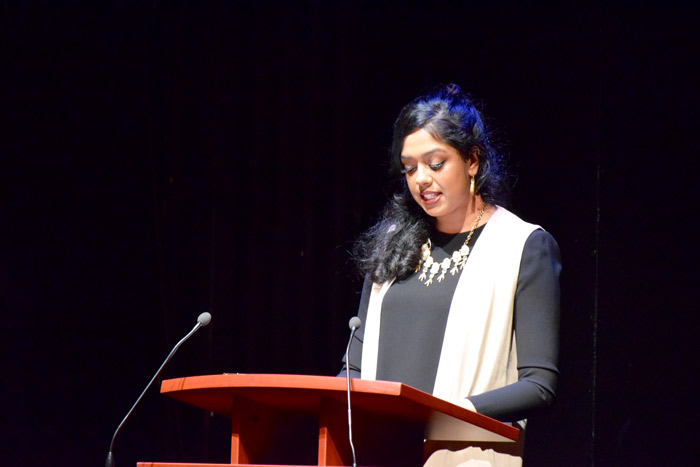On Feb. 6, Cornell University novelist, poet and English Professor Mukoma Wa Ngugi delivered the keynote address as part of a three-day African Development Convention hosted by the McGill African Students Society (MASS). In his hour-long address, Ngugi touched on a range of topics including economic inequality, terrorism, and the importance of African languages. MASS Vice-President (VP) Education, Marilyn Verghis, gave the opening remarks for the event.
“In choosing our theme, Africa Interrupted: Switching the Channels of Development Discourse, we are challenging [development discourse] to assert that Africa is not, in fact, underdeveloped,” Verghis said. “We are decentring the dominant economic and political lenses through which development is […] understood, in favour of a people centred development.”
Ngugi opened his address discussing by giving his interpretation of interruption in the context of African development. Ngugi argued for a productive understanding of interruption, which acknowledges historical reality while looking towards the future.
“We can see [interruption] through a […] historical perspective, where African nations with their own sets of contradictions were interrupted by slavery, colonialism, neocolonialism, and now, unequal globalization,” Ngugi said. “But we can also take interruption as a space to rethink what we want from the world, what we demand, what to struggle for.”
Ngugi spent most of his address discussing the issues facing what he called a people-powered, democratic Africa. He argued that the economic inequality resulting from colonialism remains a problem for development.
“Colonialism really hasn’t gone anywhere,” Ngugi said. “The Kenyatta family—which two of Kenya’s four presidents have belonged to—owns […] 500,000 acres of land in a country where land is an issue. [If] the president of your country and his family owns half a million acres of land, then what kind of democracy can you build on that? What country can we build on that vast historical inequality?”
Discussing terrorism in Africa, Ngugi emphasized the historical context. He used the Somali-based terrorist organization Al-Shabaab, most known for its 2013 attack on a Nairobi mall, as an example, arguing that the organization’s rise was a result of an US-backed Ethiopian intervention in 2006.
“After years of violent anarchy in Somalia, finally there was this loose coalition called the Islamic Courts Union, that […] managed to restore civil order […] and had support from a Somali majority,” Ngugi said. “The US didn’t like that, and neither did Ethiopia. And so, with the blessing of the US, Ethiopia invaded Somalia and got rid of the Islamic Courts Union [.…] The direct intervention of Ethiopia and the US led to the creation of Al-Shabaab.”
Ngugi also spoke about the importance of African languages to identity. He explained that in countries like Kenya, which boasts more than 40 languages, the privileged status of European languages marginalizes African culture and harms those who do not speak the dominant language.
“We can think of language as […] a carrier of culture, language as carrying history,” Ngugi said. “Then there are also the more life-and-death questions of language. If you’re locked out of your political system, your judicial system, your economic system because of language, then you cannot progress in that society.”
Ngugi closed his address with a call for attendees to imagine the world they would like to see, even if it seems far-fetched.
“The enemy of people-centred politics is the idea that we must be pragmatic,” Ngugi said. “Pragmatism kills dreams. We have to dare to invent the future. We have to dare to dream.”








